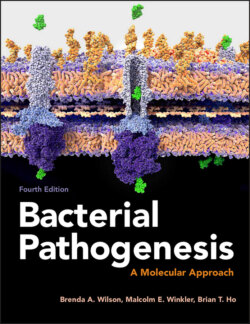Читать книгу Bacterial Pathogenesis - Brenda A. Wilson - Страница 9
ОглавлениеAbout the Authors
Brenda Anne Wilson, PhD, is currently a Professor of Microbiology and Associate Director of Undergraduate Education in the School of Molecular & Cellular Biology, College of Liberal Arts and Sciences, an Inaugural Professor in the Carle Illinois College of Medicine, and a Professor of Pathobiology in the College of Veterinary Medicine at the University of Illinois at Urbana-Champaign, Urbana, Illinois. She earned her BA degree in biochemistry and German from Barnard College, Columbia University, New York in 1981. She studied as a DAAD graduate fellow in biochemistry at the Ludwig-Maximilians Universität München in Munich, Germany. Dr. Wilson received her PhD degree in chemistry from the Johns Hopkins University in Baltimore, Maryland, where she received the Ernest M. Marks Achievement Award and an AAUW doctoral fellowship to study the biosynthesis of β-lactam antibiotics in the laboratory of Craig A. Townsend. She then undertook her NIH postdoctoral fellowship training with R. John Collier in the Department of Microbiology at Harvard Medical School, where she began her studies on bacterial protein toxins. Her first tenured faculty appointment was in the Department of Biochemistry at Wright State University School of Medicine in Dayton, Ohio. Dr. Wilson’s current research focuses on host-microbe interactions with three main basic science and translational research thrusts. The first is understanding the structure-function, cellular activities, and molecular evolution of bacterial protein toxins and their roles in disease. The second is development of novel post-exposure antitoxin therapeutics and toxin-based therapeutic cargo-delivery platforms. The third is exploiting comparative and functional genomic technologies to explore the role and co-evolutionary host-microbe interactions of toxin-producing and extensively drug-resistant bacteria and microbiomes in health and disease.
Malcolm E. Winkler, PhD, is currently a Professor in the Microbiology Section of the Department of Biology and an Adjunct Core Professor in the Department of Molecular and Cellular Biochemistry at Indiana University in Bloomington, Indiana. He earned his BA degree in biology (biophysics) at Johns Hopkins University in Baltimore, Maryland, where he remained for his PhD degree in biology (genetics), studying the control of histidine (his) operon metabolic regulation by stringent response in Salmonella enterica serovar Typhimurium in the laboratory of Professor Philip E. Hartman. He was a Helen Hay Whitney Postdoctoral Fellow in the laboratory of Professor Charles Yanofsky at Stanford University in Stanford, California, USA, where he reported the pausing mechanism in attenuation regulation of the tryptophan (trp) operon and used oligonucleotides to test the trp attenuation model. Thereafter, Dr. Winkler was a tenured faculty member at Northwestern University Medical School in Chicago, Illinois, and the University of Texas Houston Medical School in Houston, Texas, determining the pathway of vitamin B6 biosynthesis in Escherichia coli K-12 and studying the functions of tRNA modification enzymes encoded by complex operons in E. coli. He also worked on the physiological roles of the Hfq RNA chaperone and the post-transcriptional mechanisms that regulate MutHLS methyl-directed mismatch repair proteins in E. coli. Dr. Winkler next worked as a Research Advisor (Director) in antibiotic drug discovery at Eli Lilly and Company in Indianapolis, Indiana, where he changed his research program to understanding how the physiology, genetics, and cell biology of the Gram-positive human respiratory pathogen, Streptococcus pneumoniae, contribute to its pathogenesis and possibly reveal vulnerabilities that can be exploited as targets for new antibiotics and vaccines. Dr. Winkler’s laboratory is currently determining the composition, coordination, and chronology of the multiple-protein molecular machines that synthesize the pneumococcal peptidoglycan cell wall and the homeostatic and stress pathways that regulate peptidoglycan biosynthesis. Dr. Winkler is a Fellow of the American Academy of Microbiology (AAM) and a Fellow of the American Academy for the Advancement of Science (AAAS).
Brian Thomas Ho, PhD, is a Lecturer in Bacteriology at the Institute of Structural and Molecular Biology of the University College London and Birkbeck College, University of London, United Kingdom. He began his research training as an undergraduate researcher in the laboratory of Nancy Kleckner at Harvard University, where he studied changes in chromosome dynamics throughout the bacterial cell cycle. He then went on to earn his PhD degree in the laboratory of John J. Mekalanos at Harvard Medical School, where he studied various aspects of the structure and function of the type 6 secretion system (T6SS) and its effectors in Vibrio cholerae and Pseudomonas aeruginosa. Continuing as a postdoc, his research turned toward studying the T6SS and other contact-dependent secretion systems, such as DNA conjugation, in the context of in vivo microbial communities. His current research focuses on understanding how underlying bacterial cell-cell interactions shape larger macroscopic microbial population dynamics and microbial community structure.
